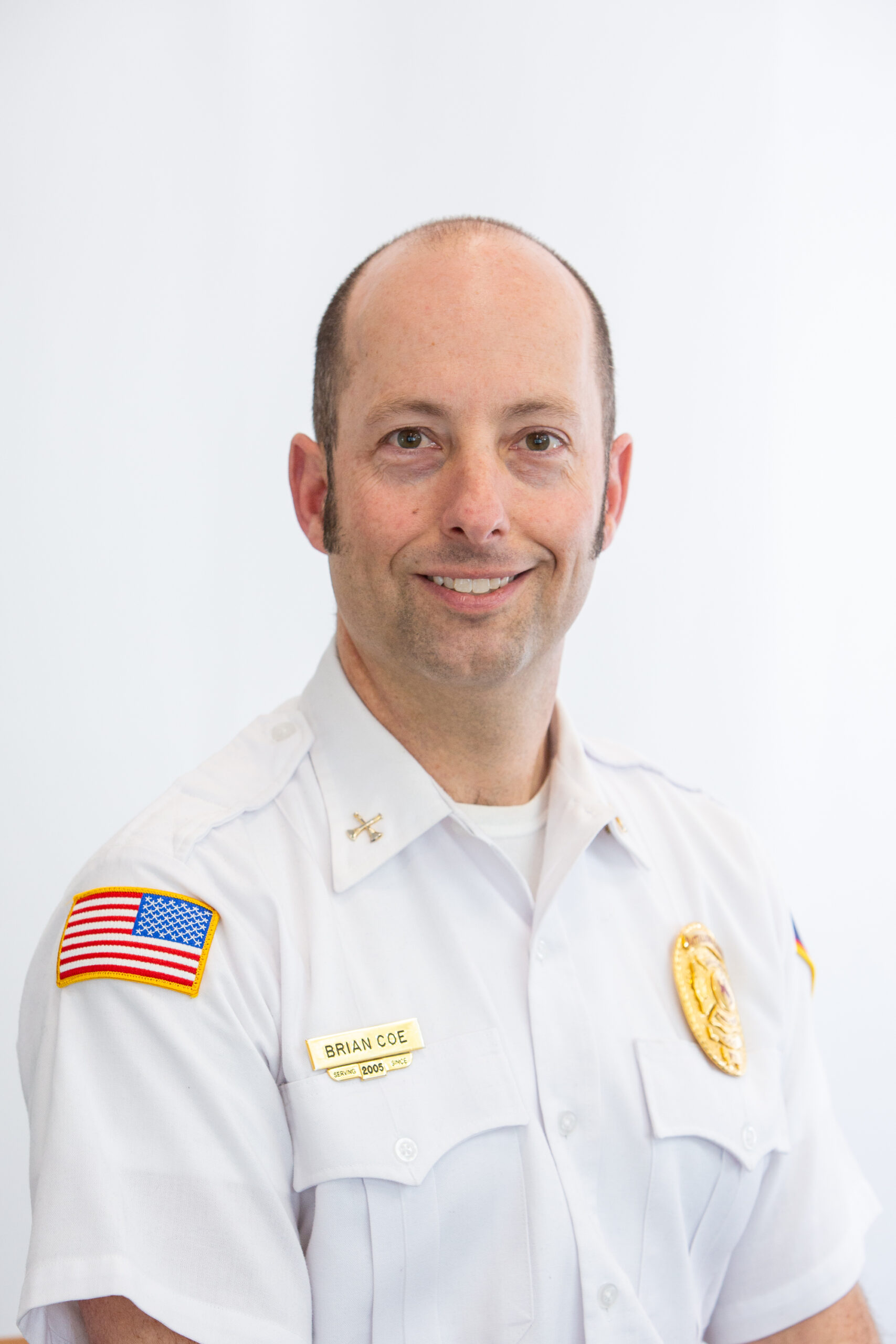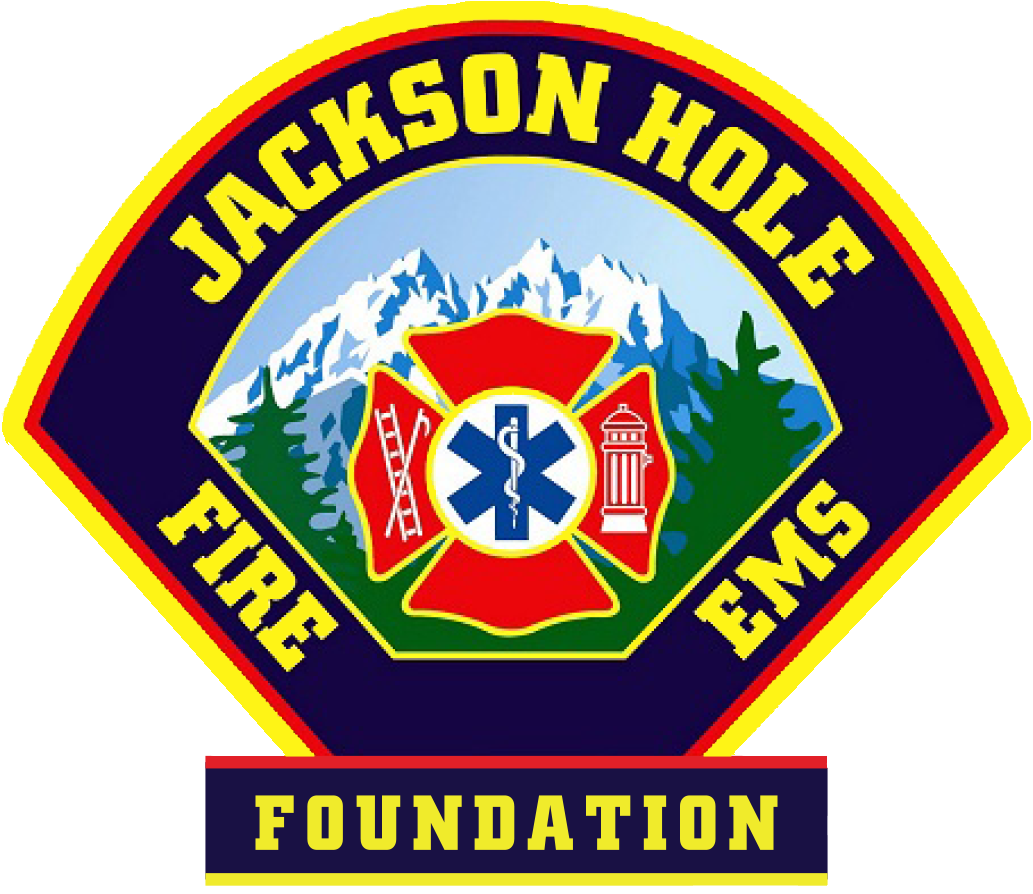
Brian Coe“It’s fun when your kids get to the point when their teachers are asking what their parents do, and they get to tell people that their dad helps people and is a firefighter. That’s pretty amazing to have that type of respect and awe from the littles in your life.”
Brian Coe
Battalion Chief – C Shift
Present
Where are you from? I was born in Greeley, Colorado but I was raised in Southern Illinois, in Centralia.
How did you come to Jackson? It’s an interesting story…we moved back when I was very young to help with the family farm in Illinois, but I knew I always wanted to come back to the west. I just never forgot the allure of the mountains and adventure, so I went to Fort Collins for grad school, to CSU, and I started applying for jobs when I was finishing my masters degree.
What is your position in the department? I am a Battalion Chief on C Shift. I worked in fire prevention for four years, but then I was the Battalion Chief of training which was a newly created position by Chief Watsabaugh who had taken over as fire chief. I then took on this role in 2011.
What do you do in your free time? I run around a lot with my kids, and we enjoy all that Jackson and the surrounding area has to offer from skiing (front country, backcountry, and cross country) to backpacking…those are kind of the big ones.
How long have you been a part of JH Fire/EMS? My undergraduate degree was in occupational safety and health, and while I was going to college, I was encouraged to get involved in emergency services. I took an internship in emergency services and learned more about responding to large scale events. I decided as soon as I got to grad school in Fort Collings to start getting involved. They had 14 stations and out of those, 2 were volunteer. I was encouraged to volunteer with Poudre Fire Authority. I fell in love with it and also quickly fell in love with hazmat. My number one priority was to keep my involvement in the fire service. I found Station 4 when I moved to Jackson, met Captain MacFarland, and started volunteering our of Station 4 when I was working for the Grand Teton Lodge Company. That was in 2005, so I guess about 18 years?
What has been your journey thus far through the department? I came in as a firefighter/EMT and new I wanted to continue that: I didn’t just want to be an EMT or just a firefighter, which was sort of the mindset at the time. I continued with that journey as a member of Station 4 and enjoyed really learning the response area, learning the department as the health and safety coordinator, and I really enjoyed the group atmosphere and the Station 4 family. I guess it was about 2 years into volunteering when I got the opportunity to go to Hurricane Katrina and provide emergency services aid and there was nothing better than an “away game.” Katrina was one of the landmark incidents for me. I came back enthusiastic about it and at that time, our training captain was stepping down and I remember at a lasagna dinner with brownies to please step up and into that role. I ended up being sort of pushed into that role of training captain, and at that point there wasn’t a centralized training division. Each training captain was in charge of coming up with its own training metrics for its own station. Ultimately, I was there for almost three years, and I took on a role as fire inspector and I saw that as an opportunity to continue with emergency services. I was still able to respond to Station 1 of course. I was also involved with fire prevention a bit, so I’ve definitely seen it all over the years.
What are your future goals in the department? I would say my future goals for the department is to keep up with the growing community, so that includes the growth and the types of development that are occurring here. It’s mostly more on the rural side, but there are a lot of urban elements as well. Multi story parking garages, etc. for example, and we definitely need to make sure we are keeping up with the needs of the community.
What about your personal goals? To support the department as much as I possibly can and to make it successful.
What would you say is your favorite part of the job? I’d still say that the training element is the most satisfying. The energy that you get, especially from the individuals newer to the department that are still trying to figure out their roles within fire/EMS, is amazing and I love helping with that element of career building, both for individuals who want to be paid as well as individuals who want to maintain their certifications and continue volunteering.
What about the most challenging? Most challenging part…I would say that realizing how much growth the department has had, so being able to look back over the last 5 years and seeing where we were and recognizing how far we’ve come, and knowing there’s still a lot of growth that we need to have…we’ve been through a huge period of growth. It’s challenging to know that there’s still so much growth that needs to be done.
What advice would you give new recruits? Some of the common ones: it’s a marathon not a sprint, find an area of passion and really jump into it, know that we do a lot of things within JH Fire/EMS…you need to find something that you’re incredibly interested in and cultivate that niche, whether as DO or ropes or hazardous materials: find your niche and your passion.
What do you wish you had known when starting? Just know that there’s going to be waves. You’re going to be riding high after a class that you’ve taken and you want to push and you want to do everything you possibly can in those areas that you’ve been enthusiastic about, just know that those waves aren’t going to last forever. … physically, emotionally, just be prepared for the wild ride.
What is the most valuable trait for someone to have in this line of work? I would say effective problem solving. We’re all problem solvers. Whenever it comes to gaining access to a patient or putting out a wildland fire: we have to be able to see what the problem is and we have to be able to connect that through critical thinking to a solution.
What do you think you bring to the department? At this point in my career, it’s probably just getting in the way. Seriously, in that all hazards arena, hopefully I’ve been able to at least model what a good leader looks like. I have been in all the areas of special operations: drones, hazmat, EMT-I, areas of expertise in wildland and structural fire, and I just hope I can act as that model of success for folks.
Who is your mentor/who do you look up to? There are several individuals that are still here that I would say are good mentors. Chief Moyer is a great individual to look to in terms of steadiness. He is an individual who has been passionate within fire/EMS for a long time; he is a great beacon. He really has that calm, collected voice that you hope to hear over the radio because it provides for a lot of confidence
How do you balance this job with family time? I definitely have lots of conversations about it, at least with my wife: the kids don’t know any different. Luckily my spouse, Laura, is incredibly gracious as well as supportive, so she definitely understands the amount of time that has been given. I think she feels the appreciation whenever it’s given as well, like when we have different banquets and things and spouses are recognized for all that they do. She’s been doing this long enough, basically since we’ve been married, so we don’t really know any different. It’s fun when your kids get to the point when their teachers are asking what their parents do, and they get to tell people that their dad helps people and is a firefighter. That’s pretty amazing to have that type of respect and awe from the littles in your life.
